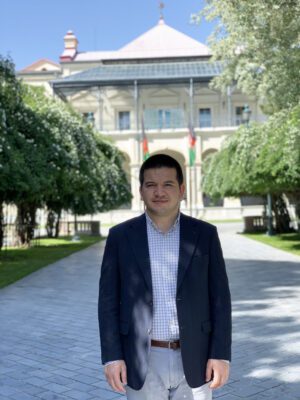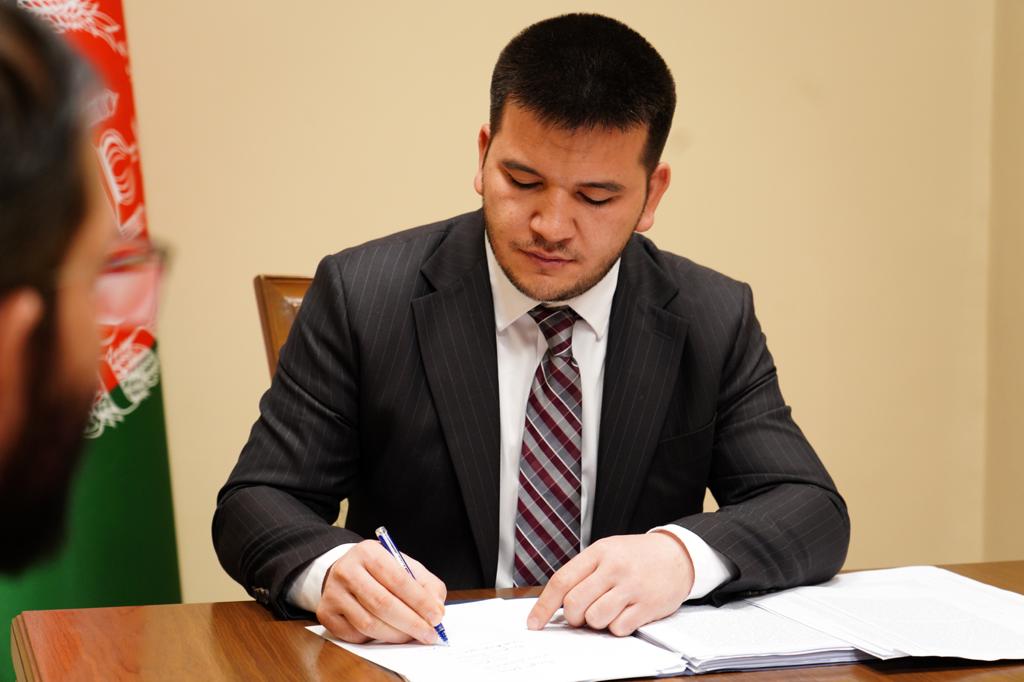
Waheed Ahmad
This year’s Benazir Bhutto Leadership Program Fellow is Waheed Ahmad, the first fellow from Afghanistan. He brings over a decade of experience at the intersection of national security, governance, and development. Waheed most notably served as a senior National Security staff of the Afghanistan Democratic Government (2001-2021). Waheed fled Afghanistan as the U.S. withdrew from the country and the Taliban took power in Kabul. Once in the U.S., he served as Resident Practitioner at the Institute for Genocide and Mass Atrocity Prevention (I-GMAP) at Binghamton University, focusing on human rights issues in Afghanistan. He is now a Mason Fellow pursuing his MC/MPA at the Harvard Kennedy School. We spoke to Waheed about his past, his time at Harvard, and his future plans.
Mittal Institute: Waheed, your passion for public service began as an adolescent. Can you talk about what drew you to helping others?
Waheed Ahmad: Absolutely. I was a young boy in my hometown of Baghlan, when a new, democratic Afghanistan was emerging. The United States had invaded Afghanistan in response to the 9/11 attacks and the Taliban regime was replaced by a democratic state. My generation was introduced to democracy and we believed in the story that the United States was telling us about its ideals. We wanted to be a part of the democratization of Afghanistan and also to help our society recover from years of wars, statelessness, and injustice.
Before I delve into what we actually did, it is important to understand the context we existed in. I am a child of the ’90s, and the society I was born in was still very much occupied by the politics of the Cold War. The Soviets had invaded Afghanistan a decade earlier [in 1979] and had sponsored and funded a communist state in the country. In response, the United States and its allies had supported the Mujahideen to fight the Soviet forces and the communist state they had helped set up. By the time I was born, so much had happened to our society. From a political and security aspect, the Soviets had already left, but their communist government was still standing in Kabul and most of urban Afghanistan was under their control. In parallel, the Western sponsored Mujahideen controlled most of the countryside and were trying to topple the communist government in Kabul. Socially, the ideological clash between Marxism and Islamism had devastating consequences for education and all other aspects of life. The Mujahideen had systematically pumped this radical ideology to mobilize resources and increase recruits from the communities. As a result, schools were turned to radicalization hubs, and the curricula in mosques were significantly changed. For example, the portion of the curriculum that included Farsi literature by people like Hafiz or Mawlawi [known as Rumi in the West] was intentionally replaced by Jihadi literature.
By the time I was old enough to start school, the Taliban that had emerged was a more radical mutation of the Mujahideen, with some ingredients of tribal supremacy. They had banned the study of all scientific subjects and history and geography, and replaced them with heavy religious studies that required repetition and memorization. I’ve never responded well to being told to do things just for the sake of doing them, so I didn’t do very well in school. I started instead focusing my efforts on making and influencing immediate, positive change in my environment through civic activities. I became the cool kid. My peers respected me for my civic leadership at a young age, and since then, I have been in pursuit of this feeling. I believe that public servants work for the greater good, but they also work for the best versions of themselves.
Mittal Institute: Something compelling about your career is that you have worked at every level of the Afghanistan Democratic Government. Can you talk about some of your most notable positions and what drove you to them?
Waheed Ahmad: I was fortunate enough to start my career at the very local level in northern Afghanistan and got an opportunity to understand the dynamics of governance, politics, and power at the ground level. This engagement was eye-opening for me in the sense that for the first time I really appreciated how destructive societies can be without accountable and functioning institutions.
My first job with the government was with a sub-branch of the Ministry of Interior for northern provinces. I was responsible for public affairs and conflict management, so I closely worked with local communities as well as international partners. In 2011, the Taliban killed my boss in a bombing. His loss inspired me to seek out positions where I could have national-level impact. So, I moved to Kabul and was lucky to get a job at the Independent Directorate of Local Governance, and the program that I worked on was funded by the United Nations Development Program. My focus was local governance and empowering local democracy by supporting the provincial councils (who were the only elected bodies at the provincial level). I really learned a lot in this role, particularly about managing programs and projects – I also got to work with almost all of Afghanistan’s 34 provinces. It was during this time that I also applied and was awarded a Fulbright Scholarship to study for my Master’s degree in the United States. I was in the U.S. from 2016 to 2018 and returned to Afghanistan at the end of my program.
Later on in Kabul, I worked in the Afghanistan National Security Council until the government collapsed in 2021. We oversaw national security policy and strategy, implementing security reforms, and supporting Afghan self-reliance in governance.
The positions that have fulfilled me most have been those in which I have had access and visibility into local realities. There is nothing more humbling than sitting in a room with someone, hearing their stories and hardships, and then getting to work on taking action to try and make their situation better.
The positions that have fulfilled me most have been those in which I have had access and visibility into local realities. There is nothing more humbling than sitting in a room with someone, hearing their stories and hardships, and then getting to work on taking action to try and make their situation better.

Mittal Institute: You were responsible for developing the 2020 Afghanistan National Threat Assessment, the second that the country had ever developed. Can you tell us about the process and the outcomes?
Waheed Ahmad: Between 2018-2020, Afghanistan’s strategic environment was rapidly changing, and so much was happening in the region and globally. The U.S. Government was actively negotiating with the Taliban in Doha, and there was growing disillusionment about the Afghan government and its future. We started an interagency group to assess this new environment and determine what type of security, economic, and diplomatic capabilities the Afghan Democratic State needed in response to this new environment. The assessment provided critical insights into the nature of the threats that the Afghan government was facing, both domestic and international. Unfortunately, many of those lessons were never applied because of the rapidly deteriorating security situation, corruption, and negligence.

Mittal Institute: Can you talk to us about the lead up to 2021, when you fled Afghanistan? How much notice did you have about the Taliban takeover; what did your exit from the country look like; and how did you find your way to Binghamton University?
Waheed Ahmad: By the day of the collapse, it was obvious that the Taliban takeover was imminent. Until that day, the collective position among the leadership was that we would stand and protect Kabul until the end. While we knew the collapse would happen soon, we did not know it would be on that day. I personally didn’t have that much notice to even take care of basic affairs, such as saying proper goodbye to friends and family members. On a seemingly normal day where I was headed to the office with some of my colleagues and friends, we instead had to flee Afghanistan with nothing but our passports, phones and wallets.
On a seemingly normal day where I was headed to the office with some of my colleagues and friends, we instead had to flee Afghanistan with nothing but our passports, phones and wallets.
Even three years later, I still don’t exactly understand how, but after our departure from Afghanistan I ended up in Ukraine. The Ukrainian people were extremely welcoming and supportive. They hosted us graciously for weeks. When I was in Ukraine, my professor and mentor, Nadia Rubaii, from Binghamton University offered a fellowship and visa sponsorship through which I could travel to the U.S. and work at the institute she was co-directing. She passed away suddenly only a few months later, and I am forever grateful to her.
Mittal Institute: At Binghamton University you researched human rights issues in Afghanistan. Can you share some of your concerns for the country, now under Taliban rule?
Waheed Ahmad: Unfortunately after the Taliban takeover, the human rights situation in Afghanistan deteriorated. The Taliban has particularly been harsh toward the women of Afghanistan, who live under an extreme policy of gender persecution. As of now, the Taliban have completely erased women from all aspects of public life, including from schools and universities. The Taliban have also systematically targeted and killed so many former security forces of the democratic government. Their rank and file still continue to harass and torture members of the security forces that worked for the democratic government. It is difficult to put into words the pain of watching the backsliding of my country while living in exile.
Mittal Institute: You are now pursuing your MC/MPA at Harvard Kennedy School. What is the current focus of your research, and what do you plan to do after you earn your graduate degree?
Waheed Ahmad: I care deeply about the effects of conflict and weak institutions on human well-being and security, not only in Afghanistan, but in so many places around the world. There is much to be learned from Afghanistan, and my wish is for all of our loss not to be in vain. So at HKS, I have largely focused on issues of conflict and fragility globally. A group of us recently started a student caucus, Fragility and Conflict Issues Caucus, that focuses on this issue. We hope this will be a platform to engage and discuss this important matter more from an interdisciplinary lens. We also aim to facilitate difficult conversations and encourage students to consider pursuing careers in this field. As far as after my degree, my preference is to work for international organizations that focus on conflict management and development.
☆ The views represented herein are those of the interview subject and do not necessarily reflect the views of the Mittal Institute, its staff, or its steering committee.
